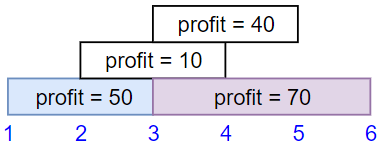Class Solution
java.lang.Object
g1201_1300.s1235_maximum_profit_in_job_scheduling.Solution
1235 - Maximum Profit in Job Scheduling\.
Hard
We have `n` jobs, where every job is scheduled to be done from `startTime[i]` to `endTime[i]`, obtaining a profit of `profit[i]`.
You're given the `startTime`, `endTime` and `profit` arrays, return the maximum profit you can take such that there are no two jobs in the subset with overlapping time range.
If you choose a job that ends at time `X` you will be able to start another job that starts at time `X`.
**Example 1:**
****
**Input:** startTime = [1,2,3,3], endTime = [3,4,5,6], profit = [50,10,40,70]
**Output:** 120
**Explanation:** The subset chosen is the first and fourth job. Time range [1-3]+[3-6] , we get profit of 120 = 50 + 70.
**Example 2:**
****
**Input:** startTime = [1,2,3,4,6], endTime = [3,5,10,6,9], profit = [20,20,100,70,60]
**Output:** 150
**Explanation:** The subset chosen is the first, fourth and fifth job. Profit obtained 150 = 20 + 70 + 60.
**Example 3:**
****
**Input:** startTime = [1,1,1], endTime = [2,3,4], profit = [5,6,4]
**Output:** 6
**Constraints:**
*
1 <= startTime.length == endTime.length == profit.length <= 5 * 104
* 1 <= startTime[i] < endTime[i] <= 109
* 1 <= profit[i] <= 104-
Constructor Summary
Constructors -
Method Summary
Modifier and TypeMethodDescriptionintjobScheduling(int[] startTime, int[] endTime, int[] profit)
-
Constructor Details
-
Solution
public Solution()
-
-
Method Details
-
jobScheduling
public int jobScheduling(int[] startTime, int[] endTime, int[] profit)
-